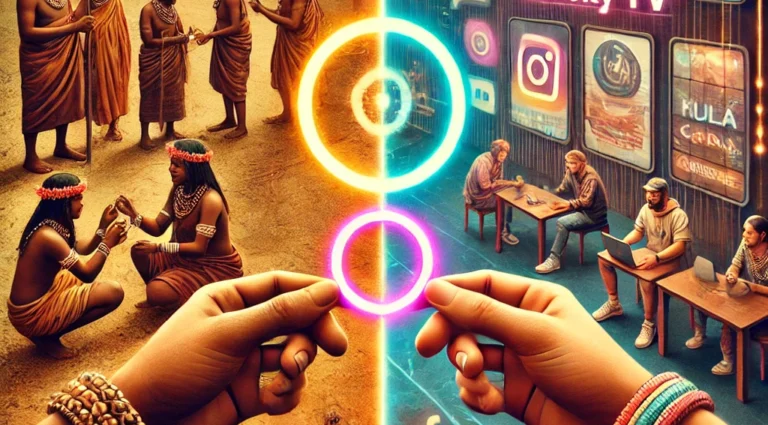A graduate seminar is a unique, collective journey. It is more than just reading books, critiquing perspectives, analyzing articles, or writing research papers. In a graduate seminar, the class culture becomes greater than the sum of its parts. We learn from one another, creating an intellectual discourse that is irreplicable. The experience feels almost magical. I was especially excited to hold a graduate seminar in one of my favorite areas, Digital Ethnography. At the same time, I was anxious. What if the seminar didn’t get enough enrollment? What if I couldn’t meet the expectations? After all, this was going to be my first graduate seminar at KU.
Fortunately, the seminar had enough students enrolled. As for my concern about meeting expectations, I realized a better approach was to set those expectations together and work collectively to meet them. With this mindset, I set out to create a semester-long journey that would be both productive and enjoyable for everyone, honoring the inherent power of collective intellectual engagement.
To document and reflect on our discussions, we will post weekly entries on this blog. The goal is to create a collective archive, to engage in writing without being overly verbose, and above all, to make our intellectual efforts tangible—periodically and collectively. Each week, seminar participants will post discussion questions and comments on Learn. The discussion leader(s) will then craft the blog post after the seminar. Sounds simple enough—or maybe not. Time will tell.
This is our first post. Ironically, it is based on a discussion held online due to a snowstorm that canceled our in-person class. As I write these words, I aim to set a model for future seminar bloggers. I want to capture the collective nature of our discussion while also sharing my own thoughts and the roadmap I envisioned for this class. I take this responsibility seriously and approach it with sincerity. 😊
Let me begin with a few reflections on the mixed feelings I experienced before our first meeting on Zoom. First, the seminar participants come from diverse disciplines—design, sociology, political science—and this interdisciplinarity is undoubtedly an asset for our journey. However, it also made me anxious. As an anthropologist, I worried about boring this diverse group with heavy anthropological theory and history.
I have always been passionate about reading classical anthropology—from Malinowski and Evans-Pritchard to Mead, Bateson, Turner, and Geertz. I often revisit their writings, especially as I grapple with the challenges of digital ethnography: deep immersion in a culture that is ephemeral, emergent, and frustratingly fast-paced. At times, I feel behind on the latest literature in the field. Nevertheless, I felt it was necessary to introduce some historical anthropological paradigms to provide context for our first meeting. For example, I highlighted core anthropological principles like *holism* and *historical particularism* as essential to conducting meaningful digital ethnographies. These principles remind us to avoid viewing technology as isolated from the rest of social life and structures. Instead, we must see technological practices as sociocultural and historically situated.
Bringing “traditional” ethnography (whatever that means) into the first seminar discussion opened the door to several tensions that we wrestled with collectively. Below, I’ve listed some of the key points that stayed with me after Monday’s discussion and my subsequent review of the discussion board on Learn.
1. Authenticity in the Age of Digital Personas
– How do we verify identities when studying people online?
– What can we learn from Hasçelikler and the City—arguably Turkish Gen-Z’s answer to blurred reality TV—in reframing our need for authenticity as “scientists” against a backdrop of mediated life? After all, mediated life has rendered every border fluid since the beginning of humanity.
– A participant observation tip from a YouTube video of the Digital Ethnography Roundtable (from three years ago): “Be present enough to catch platform-specific inside jokes, but skeptical enough to spot performative curation.”
2. Ethnographic Fragility in the Face of Ephemerality
One participant raised an important question: How do we study movements like Iran’s #WomanLifeFreedom, a globalized movement born on Twitter? Such movements are not only surveilled and attacked by authoritarian governments but also fragmented by platform politics.
3. The Tech-Magic Paradox
A participant referenced Arthur C. Clarke’s famous idea: “Any sufficiently advanced technology is indistinguishable from magic.” This resonated with me, as it justified bringing Malinowski into the discussion. His analysis of spells mirrors how users might perceive TikTok’s opaque algorithms as mystical forces.
This initial discussion, despite being held online, set a promising tone for the semester. It reminded me why I love this field and why I believe in the power of collective intellectual engagement. I’m excited to see how our discussions evolve and what new insights emerge as we navigate the terrain of Digital Ethnography together. Let’s see where this journey takes us.
